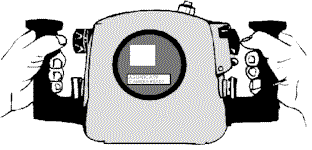 underwater Photo Course :: (2) Equipment Guide :: Underwater Camera Housings :: Digital Underwater Cameras :: Housing Features underwater Photo Course :: (2) Equipment Guide :: Underwater Camera Housings :: Digital Underwater Cameras :: Housing Features
Housing Features
|
U/W Photo Course
Learn u/w photography the easy way!
|
Most D-SLR housings require a TTLThrough The Lens. A term applied to viewfinders and metering systems that operate behind the lens. As such TTL is accurate because it sees what the lens sees. flash socket (usually the almost universal Nikonos fitting) in order to plug
in a
strobeElectronic flash gun..
As an optional extra you can usually have a second TTL socket
fitted to allow the use of two strobes. You should check whether this
socket can be fitted retrospectively if not ordered at time of purchase. Many compactType of camera that does not employ a SLR viewfinder. cameras and digicams use strobes that can be fired
optically and so do not need a plugged cord connector.
Attention to detail inside a housingA casing or box with waterproof seals designed to contain a camera or other equipment in such a way that it can be used underwater. is a
good indication of quality throughout. For instance, the wires that
connect onto the TTL socket inside the housing should be resin sealed in
order to protect the terminations, rather than left bare (and open to
corrosion).
Strobe Arm fixings You also need some means of attaching a strobe via a strobe arm
either by threaded holes underneath the housing (to take a tray), or via 'shoes' attached
to the housing (or on the handles).
 Ergonomics is
the 'invisible factor' in design. Basically it means how well the controls fall
to hand. The average DSLR camera is designed to be easy to hold and use on land,
with controls easy to use. Similarly, the controls on a housing should be easy
to use. When looking at a housing imagine how easy it is to operate when your
hands are cold, or with gloves on. Look for a positive shutter release.
Ergonomics is
the 'invisible factor' in design. Basically it means how well the controls fall
to hand. The average DSLR camera is designed to be easy to hold and use on land,
with controls easy to use. Similarly, the controls on a housing should be easy
to use. When looking at a housing imagine how easy it is to operate when your
hands are cold, or with gloves on. Look for a positive shutter release.
Handles are vital to the operation of a camera housing and all reputable makes
supply them as standard. Handles give a secure grip, stop your hand aching, and are
particularly handy when passing your camera up to the boat!
Next >> Metering
|